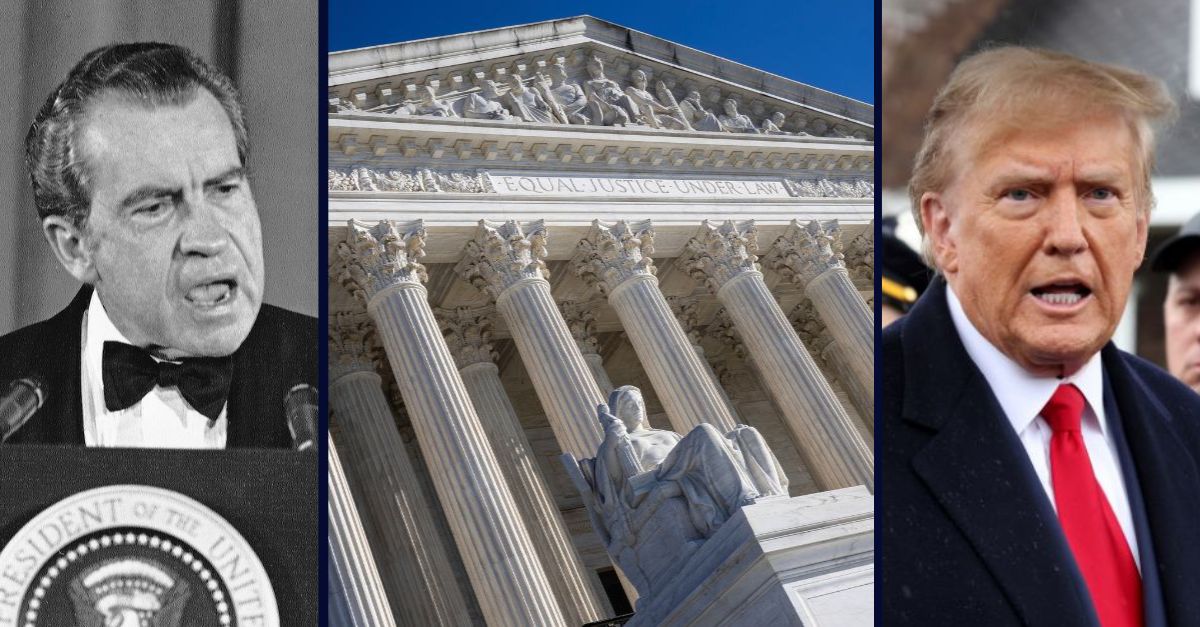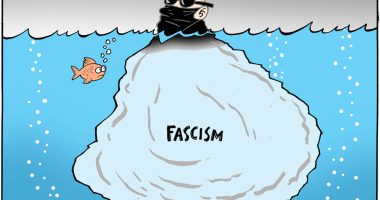
Left to right: FILE – President Richard Nixon tells a group of Republican campaign contributors, he will get to the bottom of the Watergate scandal during a speech on May 9, 1973 in Washington (AP Photo/John Duricka, File). The U.S. Supreme Court. Jan. 2024 (Francis Chung/POLITICO via AP). Former U.S. President Donald Trump speaks to the media after attending the wake of slain NYPD Officer Jonathan Diller at the Massapequa Funeral Home on March 28, 2024 in Massapequa, New York (Credit: hoo-me.com/MediaPunch /IPX).
The Supreme Court’s recent decision in Donald Trump v. United States — in which a majority of the justices found that presidents are immune from prosecution for many actions taken during their presidency — is a legal earthquake. One way to see what a huge difference this new ruling will have is to look back at Watergate to see what behavior the Supreme Court excused for all presidents.
I wrote about ex-President Trump’s ongoing criminal exposure in my new book “Corporatocracy.” I worried in that book that Trump would not be held accountable by the courts. As it turns out, I was correct to be gravely worried.
In order to understand the seismic shift we need to see what is actually in the opinion.
Categories of presidential actions
There are three new categories in the case articulated by the majority of the Supreme Court.
First, core presidential powers that are explicitly in Article II of the constitutional are newly protected from prosecution. Those explicit powers are now deemed to be in the category of “official acts” and therefore get absolute immunity from criminal prosecution. In a part of the decision which was 5-4 the court said that evidence of these official actions could not even be used as evidence in a criminal case about unprotected private criminal acts, although that was a bridge too far for Justice Amy Coney Barrett, who joined the liberal justices to say that particular finding went too far.
Second, under Trump v. United States there are implied presidential powers which get presumptive immunity. This means that when a behavior is at the outer edge of presidential power, there is a presumption that that too will be immune. But a prosecutor can rebut that presumption.
Third, the majority found that there are unofficial acts which get no immunity from prosecution. When a president is acting in his private capacity the fact that he is president does not shield him from criminal prosecution. Campaigning is an unofficial private act and that behavior can be prosecuted if there is a crime involved.
So what is now protected for presidents and how would these new rules apply to a scenario like Watergate? With its presidential immunity decision, the Supreme Court just legalized some of the crimes that took place in the Nixon White House. Watergate was a sprawling tangle of crimes that all tried to ensure that Richard Milhous Nixon would be reelected in 1972. Many of the white-collar crimes were campaign related including taking money from prohibited sources like corporations. Other blue-collar crimes included burglaries at a psychiatrist’s office and famously at the DNC’s national headquarters in the Watergate building.
Suborning perjury
Because we have Nixon’s tapes from the White House historians and the public now knows that Nixon was aware of many of the criminal conspiracies emanating out of his White House. While Nixon wasn’t personally breaking into the Watergate office building, he was certainly in on covering it up after the fact. We know this from the “Cancer on the Presidency” recording:
John Dean: I think that there’s no doubt about the seriousness of the problem we’ve got. We have a cancer within — close to the presidency, that’s growing. It’s growing daily. It’s compounding. It grows geometrically now, because it compounds itself. That’ll be clear as I explain, you know, some of the details of why it is, and it basically is because (1) we’re being blackmailed, (2) people are going to start perjuring themselves very quickly that have not had to perjure themselves …
Nixon eventually responds: How much money do you need?
Dean: I would say these people are going to cost a million dollars over the next two years.
Nixon: … What I meant is, you could get a million dollars. And you could get it in cash. I know where it could be gotten.
This is President Nixon suborning perjury to cover up Watergate and obstructing justice. But he is talking to the White House counsel to do so. In Trump v. United States, the Court clarified that a president’s discussions with the attorney general are immune. This logic could clearly apply to talks with the White House Counsel too. John Dean later went to prison for obstruction of justice for the hush money payoffs to Watergate burglars.
Selling ambassadorships, judgeships or pardons
One of Nixon’s schemes to raise campaign funds in the 1972 election was by selling plum ambassadorships to high paying donors. The most expensive ambassadorships were in Europe and the Caribbean. Other ambassadorships were cheaper. Nixon’s personal lawyer Herb Kalmbach was guilty of selling ambassadorships to wealthy donors. This scheme clearly would not have worked unless Nixon actually named these donors as ambassadors which he did. Trump v. United States changes this by giving absolute immunity to core constitutional presidential powers like appointing ambassadors. Ex president Nixon got a blanket pardon so he wasn’t charged with this or many other potential crimes. But now if Biden or a future president sells an ambassadorship or a judgeship or a pardon, that president can’t be prosecuted under this new decision.
The unitary executive theory taken to its most extreme would allow the president to weaponize the IRS, the FBI or the CIA as Nixon did. The Supreme Court just changed the nature of the presidency by making core presidential powers absolutely immune from criminal prosecution. This could make the White House a font of crimes.
Ciara Torres-Spelliscy is a Professor of Law at Stetson, a Fellow at the Brennan Center, and the author of the forthcoming book, “Corporatocracy.”
This is an opinion piece. The views expressed in this article are those of just the author.







